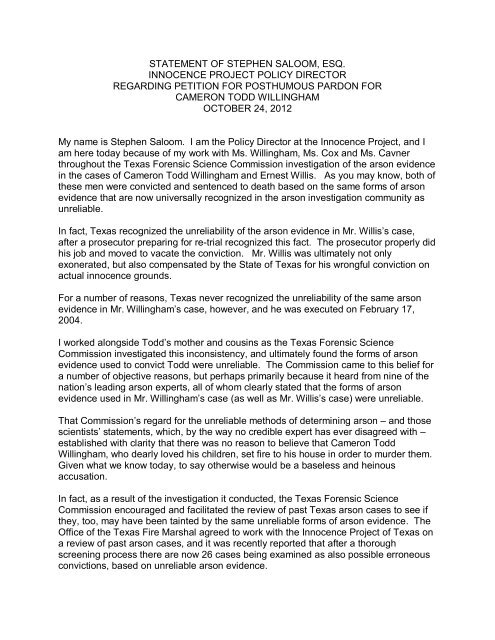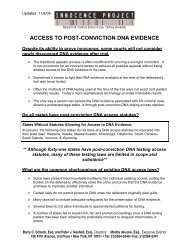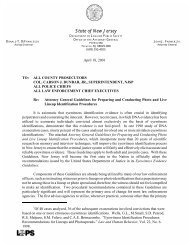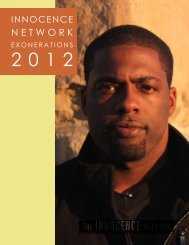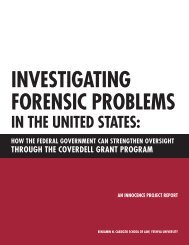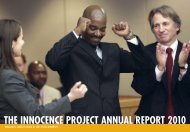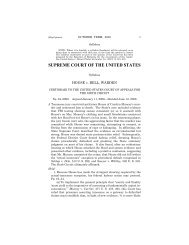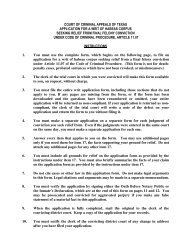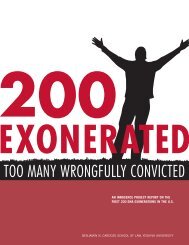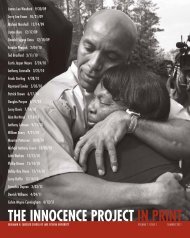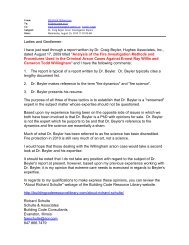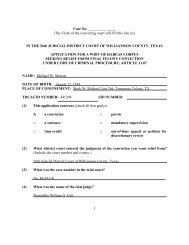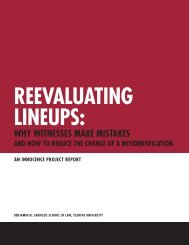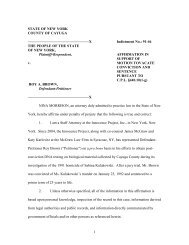statement of stephen saloom, esq. innocence project policy director ...
statement of stephen saloom, esq. innocence project policy director ...
statement of stephen saloom, esq. innocence project policy director ...
You also want an ePaper? Increase the reach of your titles
YUMPU automatically turns print PDFs into web optimized ePapers that Google loves.
STATEMENT OF STEPHEN SALOOM, ESQ.<br />
INNOCENCE PROJECT POLICY DIRECTOR<br />
REGARDING PETITION FOR POSTHUMOUS PARDON FOR<br />
CAMERON TODD WILLINGHAM<br />
OCTOBER 24, 2012<br />
My name is Stephen Saloom. I am the Policy Director at the Innocence Project, and I<br />
am here today because <strong>of</strong> my work with Ms. Willingham, Ms. Cox and Ms. Cavner<br />
throughout the Texas Forensic Science Commission investigation <strong>of</strong> the arson evidence<br />
in the cases <strong>of</strong> Cameron Todd Willingham and Ernest Willis. As you may know, both <strong>of</strong><br />
these men were convicted and sentenced to death based on the same forms <strong>of</strong> arson<br />
evidence that are now universally recognized in the arson investigation community as<br />
unreliable.<br />
In fact, Texas recognized the unreliability <strong>of</strong> the arson evidence in Mr. Willis’s case,<br />
after a prosecutor preparing for re-trial recognized this fact. The prosecutor properly did<br />
his job and moved to vacate the conviction. Mr. Willis was ultimately not only<br />
exonerated, but also compensated by the State <strong>of</strong> Texas for his wrongful conviction on<br />
actual <strong>innocence</strong> grounds.<br />
For a number <strong>of</strong> reasons, Texas never recognized the unreliability <strong>of</strong> the same arson<br />
evidence in Mr. Willingham’s case, however, and he was executed on February 17,<br />
2004.<br />
I worked alongside Todd’s mother and cousins as the Texas Forensic Science<br />
Commission investigated this inconsistency, and ultimately found the forms <strong>of</strong> arson<br />
evidence used to convict Todd were unreliable. The Commission came to this belief for<br />
a number <strong>of</strong> objective reasons, but perhaps primarily because it heard from nine <strong>of</strong> the<br />
nation’s leading arson experts, all <strong>of</strong> whom clearly stated that the forms <strong>of</strong> arson<br />
evidence used in Mr. Willingham’s case (as well as Mr. Willis’s case) were unreliable.<br />
That Commission’s regard for the unreliable methods <strong>of</strong> determining arson – and those<br />
scientists’ <strong>statement</strong>s, which, by the way no credible expert has ever disagreed with –<br />
established with clarity that there was no reason to believe that Cameron Todd<br />
Willingham, who dearly loved his children, set fire to his house in order to murder them.<br />
Given what we know today, to say otherwise would be a baseless and heinous<br />
accusation.<br />
In fact, as a result <strong>of</strong> the investigation it conducted, the Texas Forensic Science<br />
Commission encouraged and facilitated the review <strong>of</strong> past Texas arson cases to see if<br />
they, too, may have been tainted by the same unreliable forms <strong>of</strong> arson evidence. The<br />
Office <strong>of</strong> the Texas Fire Marshal agreed to work with the Innocence Project <strong>of</strong> Texas on<br />
a review <strong>of</strong> past arson cases, and it was recently reported that after a thorough<br />
screening process there are now 26 cases being examined as also possible erroneous<br />
convictions, based on unreliable arson evidence.
While I am a lawyer, my career is dedicated to criminal justice <strong>policy</strong> advocacy,<br />
improving government practice. It is that role which brought me here today.<br />
As the Innocence Project’s Policy Director, I became involved with this case because<br />
the Innocence Project has learned from the nation’s 300 DNA exonerations about how<br />
wrongful convictions happen. Our <strong>policy</strong> agenda is based on how we can prevent those<br />
consistent causes <strong>of</strong> wrongful conviction from continuing to mislead police, prosecutors,<br />
judges and juries into thinking that an innocent person is guilty beyond a reasonable<br />
doubt <strong>of</strong> a serious crime he did not commit.<br />
Invalid or improper forensic evidence contributed to roughly half <strong>of</strong> the nation’s 300<br />
wrongful convictions proven by post-conviction DNA testing. The Innocence Project’s<br />
allegations before the Texas Forensic Science Commission flow from our interest in<br />
working with government to remedy the problems that contribute to wrongful<br />
convictions.<br />
The Innocence Project therefore became involved with Todd's case as a <strong>policy</strong> matter.<br />
We wanted to be sure that the criminal justice system learned about the terrifyingly<br />
misleading nature <strong>of</strong> those old, folklore-based forms <strong>of</strong> arson evidence, to fix those<br />
problems, and thus both prevent future wrongful convictions and enable recognition and<br />
remedy <strong>of</strong> the additional past wrongful convictions that may have occurred as a result <strong>of</strong><br />
such evidence being used. The Texas Forensic Science Commission has done a<br />
tremendous amount on this point, and the Texas court system and State Fire Marshal’s<br />
Office are responding in ways that should make everybody proud.<br />
I am pleased to note that in that work, those agencies are seeking prevention, remedies<br />
and justice - not scapegoats. The exact same applies to this petition for a posthumous<br />
pardon for Cameron Todd Willingham. It seeks not to lay blame, but to do justice –<br />
however delayed - in the wake <strong>of</strong> a terrible mistake.<br />
Some might say “Why bother with a posthumous pardon? He's been executed. Nothing<br />
can be done.”<br />
To that I would simply say this. Something can be done. The government can <strong>of</strong>ficially<br />
declare that it now realizes what it didn't previously - that the evidence it had relied upon<br />
to declare Cameron Todd Willingham guilty, and to execute him, was mistaken.<br />
For it is entirely true that what Cameron Todd Willingham cared about more than his<br />
wrongful conviction, or his execution, was both that his three children died in a tragic<br />
fire, and that he was then publicly blamed for being the one who intentionally killed<br />
them.<br />
I ask any parent listening - and this will be hard - to think about if all <strong>of</strong> your children<br />
were killed in an accidental fire in which your life was spared. And then to think about<br />
this as well - what if, after they died, investigators wrongfully asserted they had pro<strong>of</strong>
that you killed them yourself, intentionally? And everyone believed it. And hated you<br />
for it. And the state then declared you guilty and executed you for it. What would your<br />
enduring wish be?<br />
And what if, even after you died, the truth was finally recognized by everyone - except<br />
the state that erroneously declared you guilty and executed you? Wouldn't you want<br />
your reputation, and that <strong>of</strong> your family, cleared?<br />
Most <strong>of</strong> us would like to leave this earth with some form <strong>of</strong> positive legacy when we die.<br />
None <strong>of</strong> us, I'm sure, want our legacies to be the falsehood that we killed our own<br />
children. Cameron Todd Willingham asked his family to clear his name, even if after his<br />
execution. I have had the honor <strong>of</strong> standing with these three women, Eugenia<br />
Willingham, Patricia Cox and Judy Cavner, as they have worked through the Texas<br />
Forensic Science Commission to establish the unreliability <strong>of</strong> the arson evidence used<br />
to convict Todd. In doing so, I have gotten to know them well, respect them immensely,<br />
and been reminded that the first devastating tragedy they experienced was the death <strong>of</strong><br />
their three beloved little granddaughters/cousins, who perished in an accidental fire.<br />
That tragedy was brutally compounded by the wrongful conviction and execution <strong>of</strong> their<br />
son and cousin, Todd.<br />
Knowing that, I stand with them in humble respect for their tireless pursuit to have<br />
Texas declare the truth about Todd so that his name can be <strong>of</strong>ficially cleared.<br />
I dearly hope that the Board <strong>of</strong> Pardons and Paroles and Governor Perry will honor<br />
these realities, and extend a posthumous pardon to Cameron Todd Willingham.


